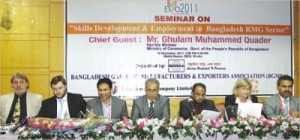


December 11, 2011
Buyers stress skills development of garment workers
An international buyer yesterday urged the garment makers to develop skilled workforce for long-term sustainability of the garment business.
Skill development, education and leadership will increase value addition in the garment products, said Pascal Brun, country head of H&M Bangladesh, at a seminar in Dhaka yesterday.
He was speaking at a seminar on 'skills development and employment in Bangladesh's RMG sector' on the sidelines of the ongoing mega textile show -- Batexpo 2011 -- at Bangabandhu International Conference Centre.
Bangladesh Garment Manufacturers and Exporters Association is organising the annual Bangladesh Apparel and Textile Exposition (Batexpo).
“We believe skill development is a long-term approach for the development of Bangladesh. It is a way to achieve sustainability,” said Brun.
From a buyer's perspective, skill development is a key factor to ensure sustainability in the sector, he added.
He suggested the apparel makers focus more on developing skilled workforce to safeguard their own interest.
Customers now want to know where the products are manufactured, the workers' working conditions and living environment, said Brun of H&M that buys garment products from Bangladesh.
He urged all the stakeholders, including manufacturers and the government, to work jointly to ensure compliance and skill development.
Speaking as a keynote speaker at the seminar, Jamie Terzi, assistant country director of CARE International Bangladesh, said, “The apparel sector of the country has a shortage of around eight lakh skilled manpower, which accounts for 25 percent of the total workforce.”
She said Bangladesh needs to develop skilled workforce to ensure higher productivity and minimise the rate of wastage at factories.
Terzi said the apparel makers should design need-based training curriculum from the factories' and workers' perspectives.
Training alone does not translate into empowerment. Technical skills, education and leadership skills are important to build the skilled workforce, said the CARE official.
Abdus Salam Murshedy, the immediate past president of BGMEA, said Bangladesh is internationally known as a leading garments manufacturer because the sector here uses state-of-the-art technology and machinery.
Around 17,000 foreign experts are currently working in the sector to produce high quality garments, he added.
He urged the government to allocate fund for skills development of the garment workers.
At the event, Commerce Minister GM Quader said RMG is a vibrant sector as it has generated a lot of employment. The sector contributes around 80 percent to the export earnings.
“The prospect of the apparel sector is immense,” said Quader. “But the sector is also facing challenges due to a global recession.”
He urged the RMG makers to focus on developing skilled manpower. “The solutions lie in providing cheap labour and skilled workforce as early as possible.”
He stressed the need for coordinated efforts to develop skilled manpower. The commerce minister urged the apparel makers to set up their own training centres for the development of the industry.
Quader also said the manufacturers should arrange training for people and ensure jobs for them.
“You just ensure jobs, people will line up to receive training even paying fees,” said the minister.

Copyright © 2020, The Bangladesh Garment Manufacturers and Exporters Association.
Version-2.0, Design & Developed by Systech Digital Limited.
Version-2.0, Design & Developed by Systech Digital Limited.
